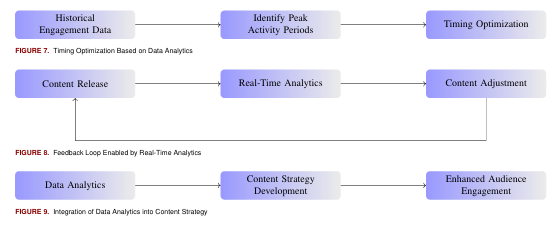Investigating the Influence of Data Analytics on Content Lifecycle Management for Maximizing Resource Efficiency and Audience Impact
Laura Fernanda Malagón Navarro
Law graduate, specialist, and researcher in social media and content marketing, San Buenaventura University, Bogotá, Colombia.
https://orcid.org/0009-0002-2677-2108
Keywords: audience engagement, content lifecycle management, data analytics, machine learning, natural language processing, predictive modeling, resource efficiency
Abstract
Data analytics has become integral to Content Lifecycle Management (CLM), a systematic approach to planning, creating, distributing, evaluating, and archiving content. Leveraging data analytics within CLM provides organizations with precise insights into audience engagement, content performance, and resource allocation. This paper examines the specific roles of data analytics in optimizing each stage of CLM, focusing on methods such as audience segmentation, predictive analytics, and real-time feedback integration. These approaches help organizations target content more effectively, adjust resource distribution based on content needs, and improve content relevance to enhance audience impact. Analytical tools allow for detailed measurement of engagement metrics (e.g., click-through rates, dwell time, conversion rates) and support more accurate predictive modeling. Techniques such as A/B testing and machine learning enhance CLM by facilitating data-driven decisions, enabling rapid adaptation to audience preferences, and improving the timing of content releases. Key challenges are also explored, including the complexities of data integration from disparate sources, the importance of data quality, and privacy concerns arising from extensive data use. This study provides an in-depth look at how data analytics informs resource-efficient CLM strategies that increase audience engagement and reduce redundant content efforts, making it possible for organizations to maximize the impact and efficiency of their content strategies. The study contributes to the growing discourse on data-driven content management practices, providing insights that can inform future studies on the intersection of data analytics and content management systems.





